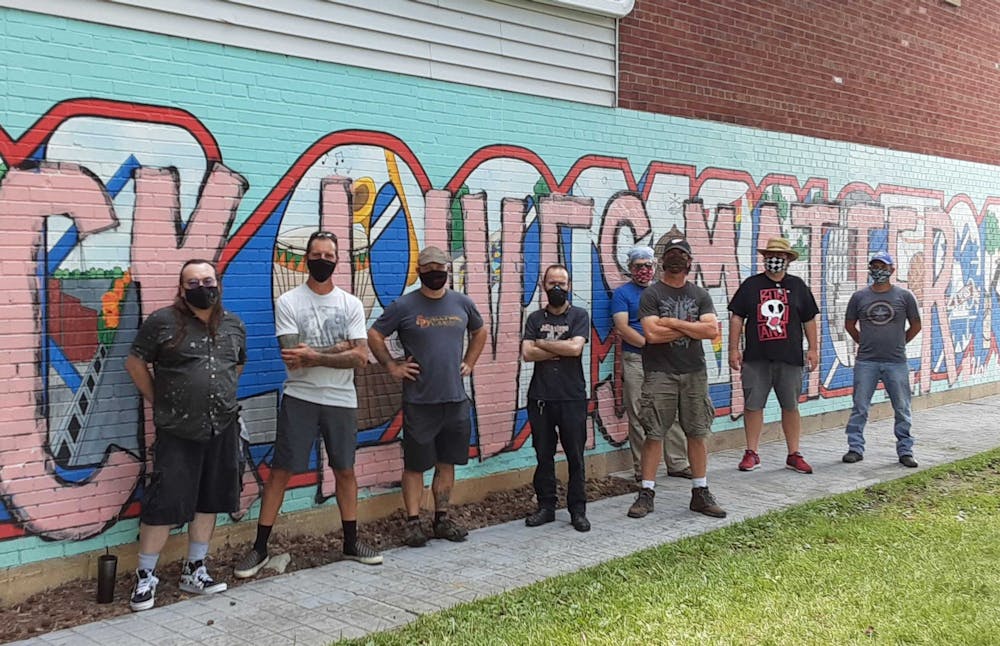About a dozen self-described “old punks” and members of the former Bloomington branch of the Anti-Racist Action network met at noon Saturday in Peoples Park to discuss their past activism, their present lives and concerns about the future.
Anti-Racist Action was a decentralized anti-racist, anti-fascist network that began in Minneapolis in 1987 and is considered by some, including Dave Tate, to be the origin of the modern American antifa movement.
Tate, who works in sales and marketing outside of Roanoke, Virginia, is the man behind a newer iteration of Anti-Racist Action, which he calls Progressive Anti-Racist Action. He first came to Bloomington in 1989 to study political science following a stint with the Marines and became involved with the underground punk music scene. He said that he considers anyone working on anti-racist causes to also be anti-fascist, because racism and fascism go hand in hand. He added that he wanted to make it clear that antifa isn’t a card-carrying organization or made up of people living in their parents’ basements.
“Somehow they’ve managed to manipulate the narrative so that we’re the terrorists and they’re the patriots,” Tate said. “I’m a Marine, I’m a patriot, I bleed red, white and blue.”
Tate said that his choice to hold the meet-up in Peoples Park was significant for a number of reasons, including that it was the site of the 1968 firebombing of the Black Market by a man with links to the Ku Klux Klan, the Bloomington ARA began there, and the seeds of the Hoosier Anti-Racist Network were planted there.
Tate drove from Virginia to Indianapolis with his 13-year-old daughter, Davin, to meet up with old ARA friends and activists in Louisville, Kentucky, Bloomington and Indianapolis, to try to encourage them to take more anti-racist action in their own lives and to meet some of the new guard.
“I’m helping my fellow white man understand that our place is to listen,” he said. “All lives will matter once we get Black lives to matter.”
Tate added that he’s over 50-years-old now, so he’s moved toward using photography and the media to combat racists rather than confronting them violently as ARA activists did in the past.
“I don’t condone violence anymore, but I don’t condemn it. There’s a place for it,” he said.
He was wearing a knife and said that if confronted by Nazis, he would not hesitate to defend himself or others.
Tate’s old friends were mostly tattooed white men in their 50s or 60s. There was an emergency room nurse from Seattle, a cook at a downtown Bloomington restaurant, a fire alarm installer, two other ex-Marines, a writer and church facilities manager and a print-shop owner. They trickled in and out of the park, chatting and taking a few group pictures. One of them showed off a new antifa tattoo. They reminisced about fighting Nazi skinheads behind Kilroy’s, tried to figure out who was who with the added challenge of face coverings and discussed changes to Bloomington in the last 30 years: the loss of a little occult bookstore that used to be on the block, the high quality of the Döner Kebab truck, new construction, Kirkwood’s new weekend pedestrian zone.
Tate’s friend Dennis, a Bloomington resident, military veteran and a former skinhead who preferred not to share his last name out of concern for making his family a target, said they were a more diverse groupwhen they were active in the 80s and 90s, but the people that had remained in Bloomington were basically all white men.
Several of those present said that lately they were focused on listening and learning or that they could not go out and protest right now because they have family members who are at a high risk of complications from COVID-19, though they generally said they supported the Black Lives Matter movement. Dennis went to one of the rallies for Vauhxx Booker with his daughter and while he isn’t part of any activist group right now, he still talks about anti-racist issues with people he knows.
“As soon as you start saying ‘systemic’ or ‘inherent’ racism, oh man, people get all bent out of shape,” Dennis said.
Tate said that he wanted to meet anti-racist organizers in town, but he had had trouble getting in contact with them. He and others present lauded them for their successful protests. Tate said he thought it was amazing that Enough is Enough and Black Lives Matter Bloomington could get 300 to 500 people out to protest on a day’s notice after Booker’s story came out.
Conversation turned toward the current antifa movement, which many of those present supported and said was being unfairly maligned.
“They’re calling them communist, they’re calling them a fascist group. How can you be anti-fascist fascists?” said Brian Kieffer, who owns a screen printing company in town.
“Half these people, their grandfathers fought against fascists in World War II,” said Kevin Burdeshaw, local author and church facilities manager, regarding right-wing opposition to antifa.
The poster for the meeting had advertised an event to “meet, greet, toast, and exchange ideas,” and “bring your own flask and mask.” Tate gave a toast with a small flask of whiskey, thanked them for gathering and urged everyone present to keep fighting racism.
“ARA every day, boys!” he said. “My whole point in coming down was to inspire you guys to keep working.”
Tate considers “ARA every day!” to be his slogan, reminding himself and others to take an active role in fighting racism every single day. He says that it’s not enough to just not be racist — you have to push for change.
“I look at racism as an elephant. How do you eat an elephant?” he added later. “One bite at a time.”




